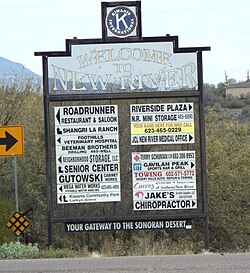Brief history
New River is named after the seasonal wash of the same name, part of the Agua Fria River system which drains into the Salt River.
The New River Mountains are part of a region extending southwards from the southeast of the Black Hills of central Arizona. The region contains mesas, hills, and mountain peaks; the region is bordered on the west by the Black Canyon, where the Agua Fria River flows south towards Phoenix, and on the east, canyons where the Verde River also flows south to enter the Phoenix valley. [1]
Early settlers
The first known settlers of the area were the Hohokam, a pre-historic Native American tribe. They were the first to establish communities in the area, however for unknown reasons the site was abandoned by 1450 AD.. Later the Tonto Apaches and the Yavapai settled in the region. The Tonto Apache lived alongside the Wipukepa ("People from the Foot of the Red Rock") and Kewevkapaya, two of the four subgroups of the Yavapai of central and western Arizona. [1] Both tribes were hunter-gatherers, they hunted (antelope, deer, birds, bush rats, etc.) and collected (agave, berries, wild plants, seeds). [2]
In 1868, Lord Darrell Duppa, an Englishman who was a pioneer in the settlement of Arizona, founded a stagecoach stop on the northeastern slope of the Gavilan Peak which would eventually become the unincorporated town of New River. The peak is within New River Mountains which are part of a region extending southwards from the southeast of the Black Hills of central Arizona. [3] Soon settlers from the east coast of the United States began to arrive and establish farms and ranches such as the T Ranch, the Y Ranch, and the Spear S Ranch. This was partially due to the passage of the 1864 Homestead Act [4] which provided availability of public lands to the newcomers. For many years the stagecoach stops were the terminus of the old Black Canyon Highway (now Interstate 17). The pavement ended in New River and continued as a dirt road to the city of Prescott. [5] [6]
The Miller family massacre
The Miller family were among the first settlers. They owned the "Station", the first stage stop established in the area. They also owned a ranch at the base of Gavilan Peak. All seven members of the family were massacred in an Apache raid, precipitating U.S. Cavalry campaigns against the Apaches. [1] The US Cavalry thus became involved in a campaign in the area to protect the settlers from further attacks. They drove out the Apaches and extended the Stoneman Military Trail which was to connect Fort McDowell in Phoenix with Fort Whipple in Prescott. The campaign ended in 1886 and the military established a base on Gavilan Peak. In 1890, the New River Stagecoach Stop was established and later became known as the Wranglers Roost Stagecoach Stop. [1]
This page is based on this
Wikipedia article Text is available under the
CC BY-SA 4.0 license; additional terms may apply.
Images, videos and audio are available under their respective licenses.

















